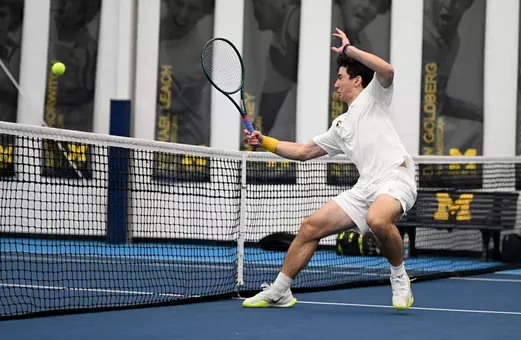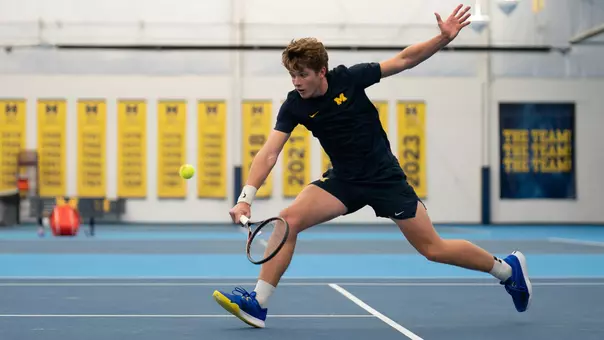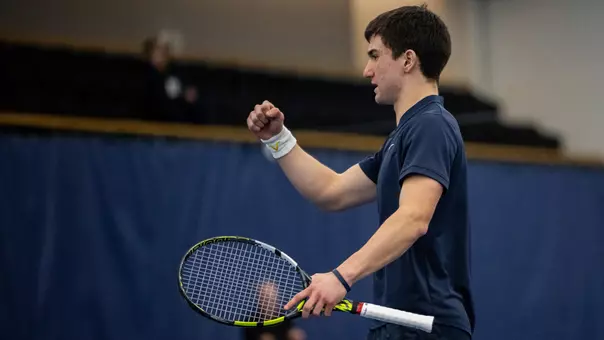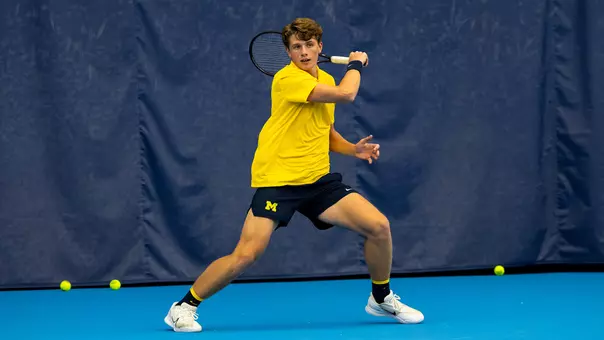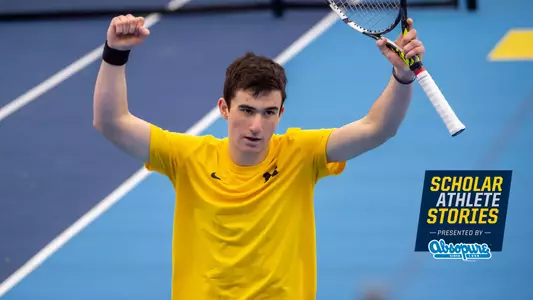
Scholar Stories: Oral Realizes Childhood Dream Playing Tennis at U-M, Pursuing Career in Sciences
4/16/2025 10:00:00 AM | Men's Tennis
Continuing the series that began in 2016-17, each week MGoBlue.com will highlight a Michigan student-athlete and their academic pursuits. These are our Scholar-Athlete Stories, presented by Absopure.
By Mya Fromwiller
For men's tennis junior Mert Oral, playing at the University of Michigan has been a lifelong dream. As a child growing up in Ann Arbor, Oral frequently attended Michigan tennis matches and even took lessons with the associate head coach when he was in middle school.
Oral started playing tennis at age 5 when his father signed him and his brother up for tennis lessons, and although Oral initially protested this decision, he quickly fell in love with the sport. By age 8, he knew he wanted to start playing competitively and soon began playing in local tournaments. However, he did not seriously explore the possibility of playing at the collegiate level until he was in high school.
Throughout the recruitment process, Oral researched a lot of different programs, but his heart was always set on Michigan, just as it had been when he was a child. So, when Michigan offered him a spot on the team, he knew he had to take it. Three years later, Oral plays under the same coach he took lessons from as a child, making the environment that much more special.
"Our current head coach, Sean (Maymi), used to be the associate head coach," he said. "When I was 10 or 11 years old, I took a few lessons from him, and I never thought I'd end up here. It was always in the back of my mind how incredible it would be to be able to be a part of this team. Being able to play at Michigan was always my big dream."
In addition to the coaching staff, Oral has also enjoyed the team environment, and the small team size of nine players has allowed them to get really close. This has helped the team navigate challenges over the past two years, such as shifts in coaching staff and graduating of captains.
"I've worked towards leaving a bit more of my own mark and forming a new culture with my current teammates," he said. "Together, we have accomplished a great deal and are working towards even bigger goals. We got to the Big Ten Championship last year and had an incredible win against MSU in the semifinals. That's definitely up there in terms of best memories."
Through his studies, Oral has also been able to pursue another lifelong dream of his: a career in the sciences. Growing up, Oral always had a strong interest in science and math, which was supplemented by his family as well, all of whom are physicians. His mom is an endocrinologist, his dad is a cardiologist, and although he was not initially certain that he wanted to pursue a career in medicine, Oral knew that he wanted to choose a major that would keep that possibility open.
Oral explored a variety of paths and eventually chose the biomedical engineering program, which allowed him to consider a career in medicine without closing off other career options. Throughout his three years in this program, he has been able to study a wide variety of subjects in his classes while also gaining practical experience. Now, as a junior, Oral has been able to work on much bigger projects in his coursework and is currently in an introduction to bio design course where students work in teams to solve current problems in the industrial and medical space.
"It's been great to have the reins taken off of us a little bit and are figuring out how to use various modeling and design software ourselves in pursuit of designing our own project," he said. "My project team is working on developing a drug-eluting bypass graft, which could be used to treat peripheral artery disease. There isn't a device that exists like that in the real world."
Oral has excelled as a Michigan student, and his work in his classes has earned him several academic awards, including the ITA Scholar-Athlete Award in 2023 and Academic All-Big Ten and Big Ten Distinguished Scholar in 2024. Although Oral has already accomplished a lot as a junior, he remains excited about the classes he has selected for next semester, including an elective called AI in BME.
"I don't have too much experience with coding or machine learning or artificial intelligence, but I think that will be a great exposure to how AI can be leveraged in biomedical engineering," he said. "I think the future of medicine is headed in an increasingly technological and AI-aided direction, so being able to get any exposure possible to AI as it intersects with biomedical engineering and medicine in general is going to be really rewarding."
Similar to the environment on the tennis team, which Oral describes as extremely supportive, the environment of his biomedical engineering classes has also been a place for him to meet new people and find a community.
"The people I've interacted with in BME have been great," he said. "I'd say it's a very collaborative environment. Everyone's willing to help each other out and everyone wants everyone to succeed."

In addition to his studies, Oral has also participated in several extracurricular activities, which allowed him to gain exposure to the medical field before deciding on his future profession. During his freshman and sophomore years, Oral worked at the Shea Lab, a Michigan Engineering lab that conducts regenerative medicine studies. The study he worked on was specifically to develop a sensor to pre-symptomatically detect Type 1 diabetes through a series of mice studies.
"The mice were specifically bred to develop diabetes spontaneously at a certain time point, and then we made these like implantable scaffolds that were put into the mice," he said. "At certain time points, we'd explant the scaffolds, analyze the gene signatures, and then, once a certain cohort of mice had diabetes, we would look back to see if there was any genetic signature from all the previous data that could have been used to predict which mice were going to get diabetes."
While working at the lab, Oral also shadowed doctors of various specialties, which allowed him to observe their everyday duties. The first doctor he shadowed was a sports cardiologist, which he especially enjoyed given his experience as an athlete.
"I just really wanted to see for myself what the day-to-day is like," he said. "I didn't sit in on any procedures or operations, but it was more so just the patient interaction. I was really impressed by the knowledge base that these doctors have when they go in and see a patient. The patient talks about their symptoms, and instantly, the doctor is able to identify the problem and treatment paths."
While observing the doctors as they diagnosed patients, Oral realized how, through patient interaction, doctors were undergoing the same problem-solving challenges that he loved in his engineering classes.
"I enjoyed the problem-solving aspect of it the most," he said. "That's also something that's similar to engineering because a lot of engineering is just problem-solving. You're given equations as tools and then you're given a real-world, practical problem. You have to piece together what information is valuable, what isn't, and then work towards formulating a solution. And that's exactly what I saw the doctor that I was shadowing do every single day with every single patient that he was seeing."
The other doctor he shadowed was an orthopedist working in sports medicine, which was also an experience he appreciated. Shadowing both doctors cemented Oral's decision to pursue a pre-medical path because he saw how impactful the doctors' interactions with the patients were.
"Being able to work with, be around and develop relationships with people is very important to me," Oral said. "And that's what I saw with the doctors that I was shadowing. That's what I know my parents, who are physicians, are able to do on a daily basis, and it just seems incredibly rewarding to know that even if it's just with one person, on any given day, you're making a tangibly positive impact on their life. And then, if you compound that over the course of a 30-, 40-, 50-year medical career, I can't imagine a more rewarding profession."
Despite Oral having one more year left at Michigan, he has begun to think about his plans after graduation and intends to take a gap year before attending medical school. During this gap year, he hopes to fully immerse himself in research and clinical experience without balancing the responsibilities of classes and tennis. Until then, Oral will continue to excel, both in his coursework and as a member of the men's tennis team -- which will prepare him well for a future career in medicine.

